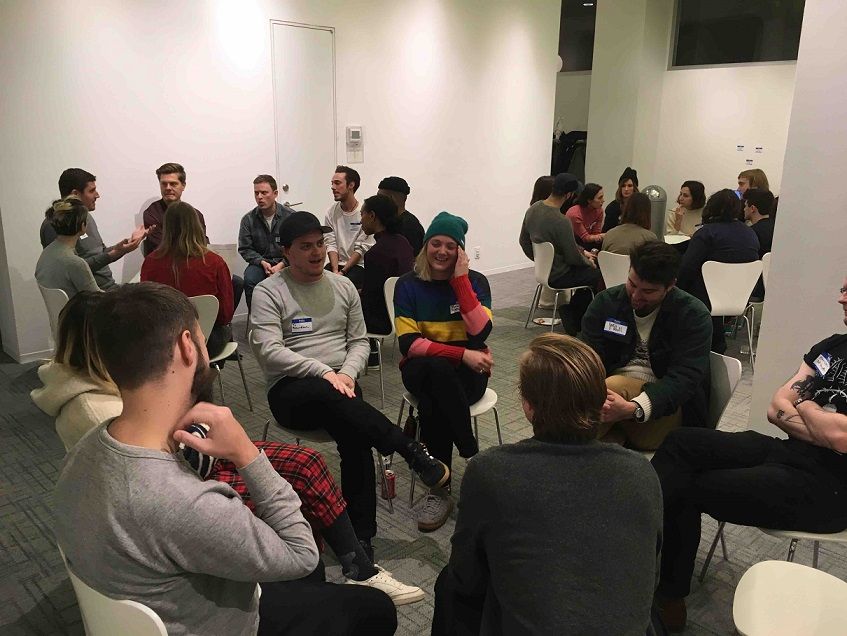We’re a freelance team called YOUR MOTHER—two directors and a producer who create branded content and commercials. Collectively we have worked with over 50 brands and ad agencies in cities from New York City to LA.
What happened to us recently has never happened to us before. We delivered our final assets for a project and per our agreement, we expected payment. But the agency wouldn’t pay us. They withheld payment with excuses, breaching our contract.
After 30 days passed, we realized they may never pay us. We began asking for advice and were shocked to learn how often this happens to freelancers (and particularly to female freelancers). The more people we spoke to, the more we realized there was a problem in the industry that needed to be acknowledged and addressed.

Some ad agencies, like the one we worked with, take advantage of freelancers by not paying them, or by paying them 6 months to a year later. They know that the only way freelancers can recoup their money when a contract has been broken is to take legal action. Ad agencies have lawyers on retainer. But, freelancers would have to go out of pocket to hire litigators. Most freelancers don’t have the money to do so, and if they did, the cost of a litigator would most likely exceed the funds they were owed. Often, freelancers have no way of getting their money if the ad agency decides not to pay them.
In our case we were fortunate to have a litigator help us on contingency, so we didn’t need to pay money up front. A lawyer will accept a case without a retainer (upfront payment), but they will collect a percentage of the total money recovered from the client. After the litigator reviewed our contract and email correspondences, he realized we had a great chance of winning the case if we went to trial. He gave us legal language to put in an email to the agency, letting them know that we had engaged a litigator, and we were finally paid.
Through this process we learned that there are not only freelancers being taken advantage of by brands and ad agencies, but also generous lawyers and litigators who want to help.
Our mission is to provide helpful information and legal aid for freelancers who have not been paid monies owed by contract. Though we cannot provide legal advice, we are hoping that these nuggets of wisdom we have gathered from our experiences will be useful to others.
First off, get yourself covered.
When working as a freelancer (aka independent contractor) often times the agency will have a contract they want you to sign. In most cases, you may not have a lawyer friend to look over the contract for you. In that case, the biggest piece of advice we can give is to READ IT! If you don’t understand something in it, don’t be afraid to ask them what it means. No matter what, do not be afraid to push back on something you don’t feel comfortable with, even if they are rushing you. You are your own small business and you have to treat it that way. If the company you hope to work for doesn't have an independent contractor, servicing, or statement of work template contract, you will need to ask a friend or find a resource online. You may be able to find someone on a site like Upwork.com that could complete one for a relatively low rate. Just find someone in your state.
Every project is different, but here are some basic terms that your client likely won’t mention in the contract. You should probably discuss these with them.

OVERTIME
This will vary from person to person but it’s key to understanding your parameters and billable hours.
RESCHEDULING AND KILL FEES (for self or vendors you hire)
Come to an agreement with the client about next steps should your project get delayed after execution of agreement. Your kill fee should include time and amount. This will vary based on each project and what is required. Be reasonable, but be fair to yourself.
Examples:
-
1 week before project begins: 2 days pay
-
48 hours notice: 4 days pay
-
If cancelled during the project, client will pay kill fee of 75% of total fee agreed upon
Note: Some larger post houses will charge their full fee if cancelled during the project, so if you are hiring the vendors yourself, you will need to make sure to discuss their kill fee in advance as well.
PER DIEM (This only applies for shoots that require travel)
What this number comes to will vary by client, budget, etc. The state department is a good resource to start with HERE. First, you will need to clarify what is covered in the negotiated per diem. Some companies prefer for this to cover just meals and they cover the lodging themselves. Others like for it to include everything. Typically, we ask for meals and a daily flat incidental per diem for our crew and expense back for lodging.
When budgets are small, the client will likely push back on this. With that in mind, don’t be afraid to ask for what it will cost to be there. For example: Las Vegas is expensive, but a small town in Alabama is not.
REIMBURSABLE EXPENSES (This will vary based on the project, scale, travel, etc.)
-
Car costs: fuel and mileage
-
Phone costs: international phone calls and data charges
-
Production: basic production supplies specific to the client or project needs
-
Post-production meals
-
Note: Some of these items would fall under the production budget, but if the creative doesn’t have visibility here, it’s also good to specify what the client will/won’t cover.
HARD DRIVES
Ensure that they will provide these to you. Or, you can include them on your reimbursable expenses list.
PAYMENT SCHEDULE
Make sure this is clarified for every penny of the budget and give specific dates that the payments are due. You will need to send your invoice before the payment dates that match your agreed terms.
-
Clarify payment type (check, wire, etc).
-
Net terms for all invoices (e.g. upon receipt, 3 business days, NET30, etc.)
OVERAGES
-
If the schedule is delayed or additional costs are going to be incurred and caused by client, the budget will be revisited and a fair overage amount will be agreed upon in good faith.
IP (INTELLECTUAL PROPERTY)
-
If you are signing a contract that they provide, there will be an NDA (non-disclosure agreement). Make sure you are comfortable with the language they are using that states they own the rights to your work. There are companies that claim ownership of any idea you have under their roof. (Bear in mind this is common for their employees, but not for freelancers).
-
Most of these projects will be work-for-hire where the IP belongs to the client. However, there are some circumstances where you might own some of the IP. If you think you have the right to the IP you should seek out an attorney to help you with this.

Here’s what to do if you don’t get paid.
Firstly, know that you are not alone. As much as possible, keep all communication professional. It may be difficult at the time, but try and remove your emotions from the situation. Also, it is in your best interest to uphold all things on your end contractually.
-
Ask the client for a payment schedule. If they are vague, push for specifics.
-
Remind the client that they are in breach of contract.
-
Give them a deadline (30 days) if net terms are not agreed to on the front end.
-
Continue to request the monies owed.
-
Save all communication with the client. This is why it’s best to refrain from texts and calls, and to keep correspondence to emails as much as possible.
-
If they are ignoring you or not giving you a definite answer, you will need to begin looking into getting legal advice, and possibly a litigator.

Here’s a support network if the methods above don’t work.
If you still have not been paid after 30 days and have followed the steps above, you can reach out to one of these lawyers who will consult you on the next step. They have agreed to be a resource exclusively for freelancers who have had their contracts breached and have therefore not received their monies owed.
-
Peter Kaufman, Kaufman Abdel-Aal LLP
-
Mike Trauben, Singh, Singh & Trauben, LLP
If you’re a lawyer or litigator and would like to join our network and extend your services, please contact: [email protected]
Kelly Fulton
Kelly was born in Johannesburg, South Africa but became an adult on the streets of New York.
After graduating from The University of Cape Town with a major in screenwriting, she studied acting and directing at New York Film Academy. She was a music producer at Q Department, then a creative director at VICE, where she oversaw creative for brand partnerships. She is currently Executive Creative Director at media platform BESE.
She wrote, directed and acted in a short film that premiered at the Rhode Island Film Festival in 2018. In 2012 she pretended to be a werewolf in a church for an immersive theatre company in Harlem that never took off. Right now she is writing a feature.


Tannaz Hazemi
Tannaz was born in Iran and raised in Sweden. Then via Chicago, Milan, Paris and New York she made it to LA in one piece.
Her work history includes modeling, publishing a book with MTV in Italy, writing pop-culture articles, and hosting shows for Tele+ and VH1 . For several years she wrote fiction before discovering screenwriting and directing. Today her short films have screened at over 50 festivals and won praise from her Father, as well as winning a daunting slew of screenplay awards.
In 2018 she made the annual list of 10 filmmakers in the Alice Initiative. She has been accepted to the Fox Filmmakers Lab, the Universal Pictures Director’s Intensive, and the AFI Directing Workshop for Women, where she won the Nancy Malone Award.
Brace yourself for her first feature.
Ali Steele
Ali Steele is an LA based producer from Atlanta, Georgia but she has also lived in NC, TX, NYC and the UK. When she's not on a plane heading to her next shoot, actualizing a budget, or running around on set with her vintage fanny pack she can be found cooking, biking, posting dank memes, or sipping a glass of wine with friends… but most likely rewatching Rick & Morty episodes.
She has produced for Viceland, NBC, Westbrook, R29, Facebook Watch, and Stept Studios with well-known talent like Will Smith, Ranveer Singh, Karan Johar, Motley Crue, Pusha T, Big Boi, Robin Thicke, Dave Gahan, Miguel, Gwen Stefani, Mana and more. Former clients include: Fox, Apple, LiveNation, Nike, Delta Airlines, Wynn, Polaris & MeUndies.
Without a doubt the highlight of her entire career was being pulled down and trampled by a herd of puppies while filming. She's currently wrapping her first true crime doc series.







